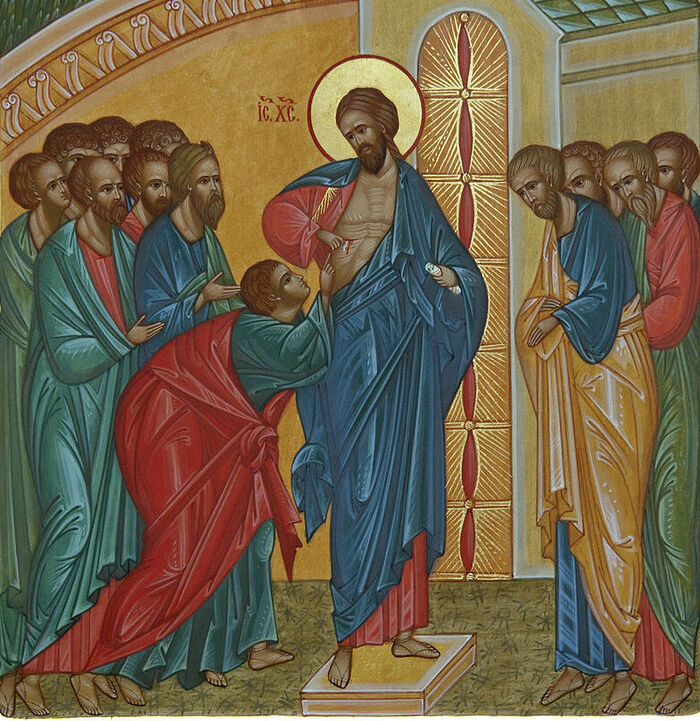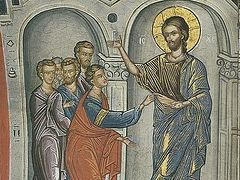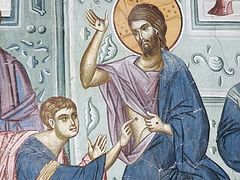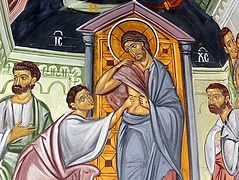Christ is Risen! Indeed He is Risen! Beloved, these brief words of greetings which are used by the faithful from Pascha and for forty days onwards until Ascension are characteristic of the Paschal season. These words are a confession and a confirmation that we beheld Christ’s Resurrection with the eyes of the heart—the spiritual eyes—and now, we proclaim this joy to all: that the Lord truly defeated death on the Cross by partaking of death, and having been laid as a dead mortal man in the grave for three days, He arose as one victorious from the dead and destroyed the bones of Hades, vanquishing the realm of the dead and annihilating it. Without any shame, we should use this confessional greeting in our day-to-day interactions. And today—Anti-Pascha or Thomas Sunday—we will examine how the Resurrection affects our day to day interactions. And our weekly interactions. This, as I mentioned, is the Sunday of Anti-Pascha or the Sunday of the Touching of the Doubting Thomas. Anti-Pascha: at first glance, one would assume the Greek word αντί in this case means against, or instead of something. Truly, the word αντί has these meanings that are transferred even into the English language; no, in this case, αντί means across. There are two cities in Greece across a bay, called Rio and Anti-Rio. Today, we are at the Sunday across from Pascha, Anti-Pascha. This is a pivotally important day: It is one of the twelve Great Feasts; yet more importantly it inaugurates the weekly—Sunday—celebration of Christ’s Resurrection. On this Sunday, each Sunday becomes a little Pascha. Hymns reflecting the truth of Christ’s Resurrection will be chanted subsequently at the Sunday services (Vespers and Matins) throughout the year. Today, therefore, we inaugurate the celebration of Christ’s Resurrection. This is a popular Sunday for most to lapse from attending divine services. After all, according to common thought and logic, many hours were spent in church during Holy Week and perhaps, for some, even during Bright Week. And if we carry on with this logic, how mistaken we are! On this Sunday we proclaim to the world that we are witnesses of Christ’s Resurrection, and we make a solemn promise: to carry the Resurrection within us by God’s help daily, and weekly—on Sunday, the Lord’s Day—to go forth and to proclaim by our very act of worship that we, the Orthodox Christians—are manifesting the Truth of the Resurrection in our lives.
And yet, none of the Apostles beheld the Resurrection itself. The Lord arose from the dead in the midst of the night as a Bridegroom coming forth from the chamber. He manifested Himself, He displayed the tokens of victory and the Resurrection to the Apostles and to the Myrrhbearing Women—after the fact. And through these witnesses we have also believed in and beheld the Resurrection of Christ. Some worshiped Him after the Resurrection, the Gospel proclaims to us, but some doubted. Today, besides inaugurating the weekly celebration through the year of Christ’s Resurrection, we also remember the events surrounding one such Doubter: the holy apostle Thomas. Thomas was absent during the first Resurrectional appearances of Christ, which occurred on Pascha and throughout the week after the Resurrection. In fact, when confronted by the other Apostles with the good news of the Resurrection Thomas blatantly states: “Unless I see in His hands the print of the nails, and place my finger in the mark of the nails, and place my hand in His side, I will not believe." Eight days later, we continue to read in the Gospel of John, His disciples were again in the house, and Thomas was with them. The doors were shut, but Jesus came and stood among them, and said: "Peace be with you." Then He said to Thomas, "Put your finger here, and see my hands; and put out your hand, and place it in my side; do not be faithless, but believing." Thomas answered Him, "My Lord and my God!" Jesus said to Him: "Have you believed because you have seen me? Blessed are those who have not seen and yet believe.
Peace be unto you. This peace which Jesus transfers to the Apostles is the power and operation of the Holy Spirit by which they themselves become participants and partake of the Resurrection, and through which they preach the Resurrection and proclaim the Resurrection’s encompassing power and might throughout the world. The Lord, being all-powerful and all-knowing, realizes the Doubting Disciple must himself touch the Resurrection to believe. The Holy Fathers in the hymnography of this day speak of Thomas’ doubt as being a positive attribute. Oh, the good doubt of Thomas! Though but earthen clay and a common man as you and I, he received a divine invitation to touch the Lord’s hands—where the print of the nails were—and to place his hand in His side. And with this command came a loftier command: Do not be faithless, but faithful! We, like Thomas, have received the invitation to touch the Resurrected, Holy Lord Jesus in the Holy Eucharist. Through our pious and godly communing of the Holy Mysteries, we too have become witnesses of and participants in Christ’s Resurrection. We too are given the command to lay all doubt aside. Yet, it is only natural to doubt and to have reservations. Remember once again: Thomas’ doubt is hymned as a positive quality.
The Doubt of Thomas is manifest in each of us. We question, and this is only natural, as with the physical eyes, the eyes of science and rationale and undoubted proofs, we have not, in the majority of cases, beheld the Resurrection. Yet this—the Resurrection—is a matter of deep faith, and faith is a matter of things unseen as the Holy Apostle Paul teaches us. The same Apostle teaches us that now we behold but dimly, as through a glass. The Resurrection is the cornerstone of Christianity: without it, if it did not actually occur, then our whole faith is in vain. Search the Scriptures though, and you will find foreshadowings of the Resurrection throughout the Old Testament. Indeed, the two Apostles—Luke and Cleopas—who were walking on the road to Emmaus said, after the Lord appeared to them and walked with them in disguise on the very evening of that Day: "Were not our hearts burning within us while he talked with us on the road and opened the Scriptures to us?" Read the Gospels, and you will find multiple accounts of the Resurrection which are undoubtedly true. We must pray that any seed of doubt left in us is transformed by the grace of the Resurrected Christ into a powerful witness to His Holy Resurrection. We must pray that He grant us the grace and understanding to proclaim to the world as the Lord said: That the Christ will suffer and rise from the dead on the third day, and in His name repentance and forgiveness of sins will be proclaimed to all nations. Today, as we supplicate Christ to grant us a clear vision of the Resurrection with the eyes of our heart, we pray that the fruits of the Resurrection: faith unashamed, love unfeigned, humility, chastity, virtue, hospitality, and charity—we pray these become the signs by which the Resurrection is manifest to the world. Perhaps the world may doubt, but they will know we are Christ’s disciples if we maintain the bond of concord and love and if we live by, through, and for Christ’s Resurrection, making this Resurrection the cause and reason for our very existence and being. Χριστός Ανέστη! Αληθώς Ανέστη!




